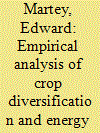| Srl | Item |
| 1 |
ID:
185712


|
|
|
|
|
| Summary/Abstract |
Despite the importance of energy in countries' economies, the vast majority of people, especially in developing countries, live under the energy poverty line. To mitigate this trend, several policy options have been enacted to promote the use of clean and modern fuels given the targets set out in the Sustainable Development Goal Two (SDG2). However, there is a lack of systematic empirical evidence on how crop diversification can alleviate energy poverty in developing countries. This study used the seventh round of the Ghana Living Standard Survey (GLSS 7) to test the effect of crop diversification on the multidimensional energy poverty index (MEPI). I employ the instrumental variable (IV) and the Lewbel two stage least squares (2SLS) techniques and perform several robustness checks to address the potential endogeneity in crop choices. The estimates show that crop diversification is associated with a 0.829 standard deviation decreases in household energy poverty. The effect is prominent for urban and high-income earning households. Household income is identified as the main potential channel through which crop diversification influences energy poverty.
|
|
|
|
|
|
|
|
|
|
|
|
|
|
|
|
| 2 |
ID:
183596


|
|
|
|
|
| Summary/Abstract |
This article examines the effect of off-farm work on cooking energy choice and time poverty using data from the seventh round of the Ghana Living Standard Survey (GLSS) while controlling for a wide range of socio-demographic, community, and other geographic factors. We identified three main fuel types (dirty, transition, and clean fuel) and constructed different time poverty cutoffs based on household committed time. After controlling for endogeneity in off-farm work, we found that an increase in off-farm work is associated with a decrease in the use of dirty fuel but positively associated with clean fuel and time poverty. The result is robust to different estimation methods of addressing endogeneity and additional measures of time poverty. The findings show that consumption expenditure is an important channel through which off-farm work influences cooking energy choice and time poverty. The gains of using clean fuel can be sustained through public investment opportunities that encourage off-farm work. At the same time, time poverty can be reduced through the promotion of time-saving technologies.
|
|
|
|
|
|
|
|
|
|
|
|
|
|
|
|